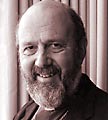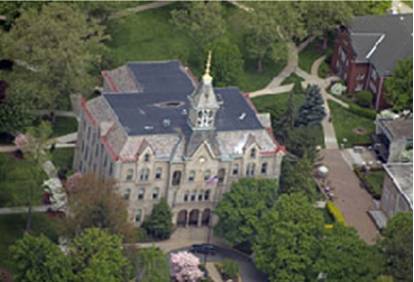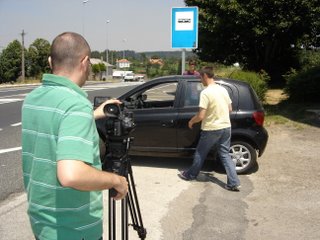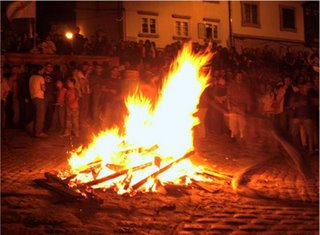Sunday, July 30, 2006
Thoughts From a Lebanese Christian
N.T. WRIGHT, Bishop of the Anglican Diocese of Durham, England
 When I went to college I absolutely loved my Bible classes. I remember reading books on hermeneutics (how to read something written for another time and another place and understanding what it means today). I remember reading about and studying Judah´s exile- it takes up about two-thirds of the Old Testament but is rarely taught on in most churches. I remember pouring over commentaries and reading books that discussed everything from covenant theology and dispensationalism to the workings of the Holy Spirit in the newly birthed church in Acts.
When I went to college I absolutely loved my Bible classes. I remember reading books on hermeneutics (how to read something written for another time and another place and understanding what it means today). I remember reading about and studying Judah´s exile- it takes up about two-thirds of the Old Testament but is rarely taught on in most churches. I remember pouring over commentaries and reading books that discussed everything from covenant theology and dispensationalism to the workings of the Holy Spirit in the newly birthed church in Acts.Then I remember going home for break. I went to a local Christian bookstore, because after devouring all of this rich theological meat I was hungry to read more. I was so disappointed, because what I found in the bookstore were titles like "How to be a better.... Mom, Dad, Pastor, daughter, son, preacher, etc", titles on church growth, Christian diet books, and Christian Fiction that taught weird perspectives on end times and other Christian topics. I would go through the whole bookstore and might emerge with one small morsel of something that would actually challenge me in my faith and my understanding of the Bible.
I wondered what happened to all of the wonderful books that I was reading at college. Who was hiding them and where were they keeping them? So ever since I have been on a quest for books that really challenge me and my thinking. Recently I have encountered an author that gives me that same feeling of being stretched and challenged that I remember in my college Bible classes. When I read his books or listen to his talks I go away thinking about what he said for days and weeks on end. I normally hate watching or reading something that I have already read before, but I find that with his works after I have thought about it for a while I don´t mind going back and listening again to see what I missed the first time.
Last night at our team worship time we watched a video by N.T. Wright that took place in the "National Cathedral" in Washington D.C. and I was so encouraged and challenged by his talk. If you desire to be challenged in your understanding of the Bible and who Jesus was and is than I highly recommendn getting your hand on one of his books, or going to his web site and reading one of his papers or listening to some of his mp3 talks.
Friday, July 28, 2006
Around the world in 80 seconds...
 Here are some interesting blogs that I have been following from around the world.
Here are some interesting blogs that I have been following from around the world.
Tuesday, July 25, 2006
Saturday, July 22, 2006
The Big 29
 that's right. I just turned 29 this past week. It´s kind of crazy, because I don´t feel that old..or sometimes I feel older. Lori made me my favorite birthday cake- chocolate mint. There are not cake mixes here, so she made it from scratch and it was wonderful.
that's right. I just turned 29 this past week. It´s kind of crazy, because I don´t feel that old..or sometimes I feel older. Lori made me my favorite birthday cake- chocolate mint. There are not cake mixes here, so she made it from scratch and it was wonderful.Lori had some contractions (not just brackston-hicks, but the real deal) on my birthday! I thought for sure it was time for the baby to come (I packed my backpack for the hospital), but it turned out they were just practice. It could be anyday now. Her due date is August 6.
Sunday, July 16, 2006
Random Facts
- Lori and I have spent more married years in Spain than in the States.
- The cafe has gone through well over 10,000 napkins since it opened just over two years ago.
- Both of our daughters (soon to be all three daughters) were born in Santiago.
- Santiago has around 100,000 inhabitants, 40,000 university students, between 1-3 million tourist annually and over 1,100 bars and cafes.
- Most lunch breaks happen from 2-5pm and then everyone goes back to work/school until about 8pm.
- In the summer in Santiago the sun does not set in the evening until close to 11pm.
- If you are a tourist in Spain you can rent a car on your passport without any knowledge of Spanish.
- If you live in Spain more than 6 months and want to drive your own car you have to go through Spanish drivers ed (both written and driving).
- Quite often one hears fireworks in Spain in the middle of the day. Everyday (literally) is a Saint day and Saint day celebrations include fireworks.
- Spain is a Constitutional Monarchy which means it has a king and a parliament.
Wednesday, July 12, 2006
Geneva Alum Blogs
 Every once in a while when I am cruising the blogosphere I come across some blogs I want to share. These are all blogs of Geneva people that I have found. Mark Helsel went to Geneva and then was a Youth Intern at First Presbyterian Church when I was in highschool. I have been following Keith Martel´s blog for quite some time and just last weekend I was pleasantly surprised to stumble upon Ben Kendrew´s Blog as well as Kent Chevalier´s. If you know of any other Geneva bloggers, drop their address in the comment section below this post.
Every once in a while when I am cruising the blogosphere I come across some blogs I want to share. These are all blogs of Geneva people that I have found. Mark Helsel went to Geneva and then was a Youth Intern at First Presbyterian Church when I was in highschool. I have been following Keith Martel´s blog for quite some time and just last weekend I was pleasantly surprised to stumble upon Ben Kendrew´s Blog as well as Kent Chevalier´s. If you know of any other Geneva bloggers, drop their address in the comment section below this post.
Saturday, July 08, 2006
Short Film

 Abi and Caleb took part in their first short film yesterday. A friend of ours is directing a short film for a local competition and needed some children to stand in for a short part. Our friend explained their parts to them in Spanish and then Abi and Caleb acted out their parts. It was fun to watch the process. I am looking forward to seeing the final cut.
Abi and Caleb took part in their first short film yesterday. A friend of ours is directing a short film for a local competition and needed some children to stand in for a short part. Our friend explained their parts to them in Spanish and then Abi and Caleb acted out their parts. It was fun to watch the process. I am looking forward to seeing the final cut.
Thursday, July 06, 2006
Love and Obedience
"GETTING CAUGHT BY JESUS
Jesus tells parables that catch his readers in the web of a moral dilemma so they can learn. A good example of this is the Parable of the Good Samaritan.
An "expert in the Torah" asks Jesus how to inherit eternal life. Jesus says, "What does the Torah say?" The expert answers, probably because he has heard the Jesus Creed from others: "Love your God... and love your neighbor as yourself." Jesus says, "A+!"
Riding a little wave of Jesus´approval, he gets a little chesty like a first-year theology student: "Well then, who is my neighbor?" What the scribe is really asking is not just "who is my neighbor?" but "who is pure and who is not?" He´s asking about the classification system. The "who is pure" question is also a "who is better loved?" question. Knowing that the question masks a larger concern, Jesus tells storyto catch this expert in the web of a moral dilemma so we can all learn.
On a trip from Jerusalem to Jericho a man is attacked by a gang of robbers, leaving him nearly dead. A priest and a temple assistant (a Levite) come upon him seperately, but fearing impurity from contact with a corpse, the skirt to the other side of the road. They are following the Torah, mind you. One of Moses´books spells it out: Dead bodies spread impurity. In another of his books, priests are told not to contract corpse impurity unless from the body of a "close relative." If close enough to a corpse to cast one´s shadow over the corpse, the person casting the shadow becomes impure. So, they suffle to the other side of the road. This is not heartlessness so much as it is obedience. Therein lies the learning.
There is not a Jew who hears Jesus´parable who thinks the priest (or the Levite) is doing anything but what the Torah regulates. The irony of this little plot is that in "obeying" the Torah the priest and Levite are disobeying what is at the bottom of the Torah: loving others. Ironically, it is a stereotyped character that does what is right: a Samaritan. Samaritan in this parable stands for social hostility and religious heresy. The priest and the Levite get caught while the Samaritan gets the teacher´s thumbs up.
If we are to love God and love others, Jesus is asking his audience, what happens when love-of-God-as-obeying-Torah (the Shema of Judaism) comes into conflict love-of-God-as-following-Jesus (the Shema of Jesus)? That´s a tough one, for all of us. But for Jesus the answer is clear: Loving God properly always means we will tend to those in need.
A plot within a plot. Jesus catches anyone who attends to the Torah (like avoiding impurity) but fails to attend the person in need."
Sunday, July 02, 2006
Cultural Event
 Last night we had our third cultural event at the cafe. It was a fun event with the group Truesdell from California doing a folk/rock acustic set. We also have a new art exhibit from a local artist and it turns out that she lives in our neighborhood. That rocks! It is cool how many people we have been meeting through the art exhibits.
Last night we had our third cultural event at the cafe. It was a fun event with the group Truesdell from California doing a folk/rock acustic set. We also have a new art exhibit from a local artist and it turns out that she lives in our neighborhood. That rocks! It is cool how many people we have been meeting through the art exhibits.
Saturday, July 01, 2006
Cool Pix
 Chris Warren is an IT guy on his way to Russia. He stopped in Spain for a few weeks to hang out with our team and give us a hand. He has captured some great photos around the city, of us repainting the cafe (a special thanks to Lauren and Shayna for donating the paint), and of the night of Saint John tradition where people jump over fires to get rid of evil spirits (mostly people just jump for fun these days). You can see his photos here and read his thoughts here.
Chris Warren is an IT guy on his way to Russia. He stopped in Spain for a few weeks to hang out with our team and give us a hand. He has captured some great photos around the city, of us repainting the cafe (a special thanks to Lauren and Shayna for donating the paint), and of the night of Saint John tradition where people jump over fires to get rid of evil spirits (mostly people just jump for fun these days). You can see his photos here and read his thoughts here.

